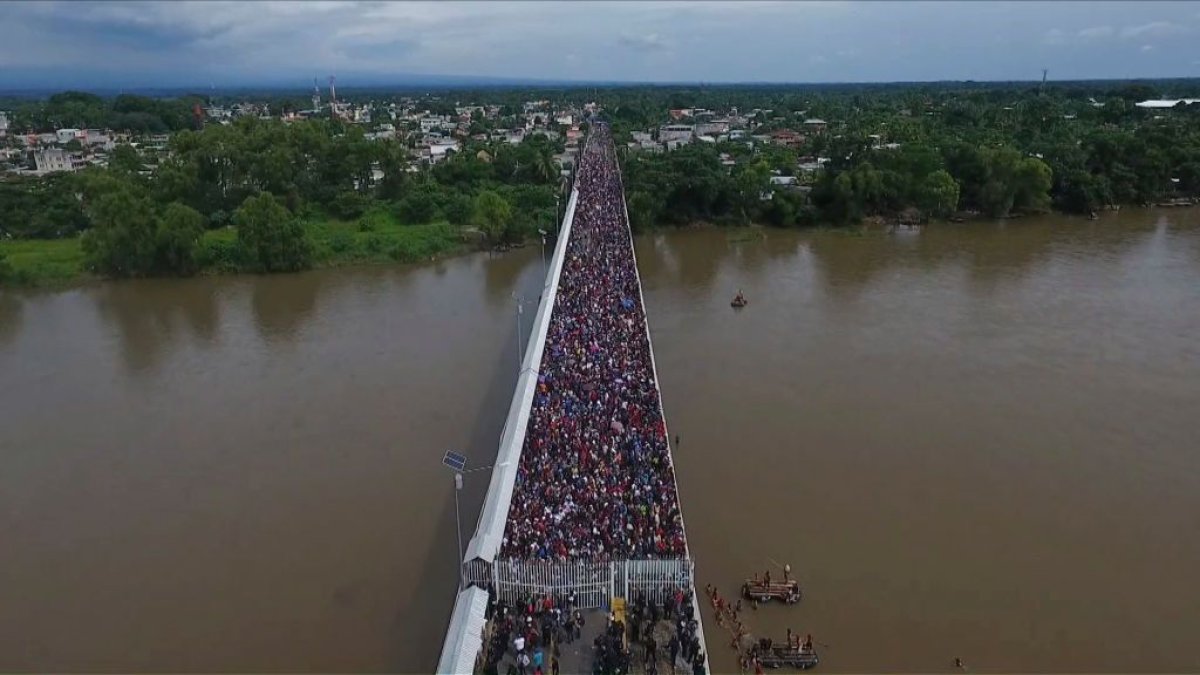Hundreds of people in a caravan of migrants travelling across Central America attempted to breach the Mexican border on Friday, as local governments began preparing to disperse the convoy under pressure from Washington.
Migrants poured through Guatemalan border posts in the town of Tecun Uman and onto a bridge leading to Mexico, only to be halted by dozens of Mexican police in riot gear.

Mexico's president sharply rebuked the migrants for the border surge.
U.S. President Donald Trump has warned the Central American caravan—which includes women, children and elederly people—must be stopped before it reaches the United States, and Honduras and Guatemala said late on Friday they were mobilizing to assist the return of Honduran migrants to their homeland.
President Trump threatened Friday to close the U.S. border to halt the carvan, and said he would call on the military to assist if necessary.
Some migrants violently shook fences at the border and police said a few officers were injured in clashes. A handful of migrants jumped into the Suchiate River below to swim for rafts. Others turned back toward Guatemala.
Carrying backpacks and small children, many migrants simply sat down on the bridge. Some said that they had been tear gassed. As the afternoon drew on, a tropical storm, Vicente, formed nearby off the Pacific coast.
Jose Brian Guerrero, a 24-year-old Honduran traveling with neighbors and his extended family, told Reuters he had joined the caravan to escape violent street gangs, and to find work.
"There's nothing for us in our country," said Guerrero, who used to sell beans in Honduras.
Mexican authorities say that migrants must have valid documents in order to be admitted into the country.
On Friday evening, Honduran President Juan Orlando Hernandez said he had spoken to his Guatemalan counterpart Jimmy Morales for clearance to send civil protection personnel to help the Hondurans and to find transport for those wanting to return.
"We'll continue this operation for as long as is necessary," Hernandez said in a post on Twitter.
Shortly afterwards, Guatemala's government tweeted that Hernandez would meet Morales on Saturday in Guatemala City to implement a strategy for returning the Honduran migrants.
Meanwhile, in a late televised address, outgoing Mexican President Enrique Pena Nieto called the mass rush to penetrate the border "unprecedented", accusing some migrants of attacking police.
"Mexico does not and will not allow (people) to enter its territory illegally, let alone violently," he said.
A similar caravan of Central Americans that formed in southern Mexico in late March also drew the ire of Trump, who on Thursday threatened to use the military and close the southern border if Mexico did not halt the new march.
Such a move would cause chaos on the crossing, one of the world's busiest, and badly disrupt trade.
Speaking in Scottsdale, Arizona on Friday, Trump said he "appreciated very much" Mexico's efforts to stop the caravan.
"If that doesn't work out, we're calling up the military - not the (National) Guard - we're calling up the military," he told reporters. "They're not coming into this country."
Trump has also threatened to cut off aid to Honduras, Guatemala and El Salvador - some of the poorest and most violent countries in the Americas - if they fail to prevent undocumented immigrants from heading to the United States.
In a tweet Thursday he had praised Mexico for its decision to send riot police to halt the progress of the caravan.
Their emigrants make up the bulk of people now caught trying to enter the United States illegally every year.
Several migrants at the Guatemala-Mexico border spoke of entire neighborhoods leaving their homes to join the trek after news circulated on social media of a call for a new "caravan" to Mexico six months after the previous one.
Uncommon Knowledge
Newsweek is committed to challenging conventional wisdom and finding connections in the search for common ground.
Newsweek is committed to challenging conventional wisdom and finding connections in the search for common ground.
About the writer
To read how Newsweek uses AI as a newsroom tool, Click here.








